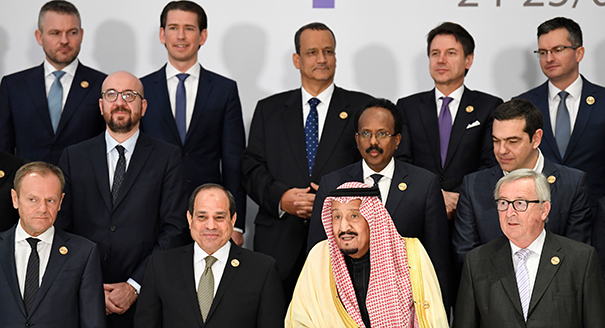This first-ever summit earlier this week in Sharm al-Sheikh, Egypt, between the European Union (EU) and the Arab League raised hopes for a new start in cooperation between the two regions. The meeting represented an admirable attempt by the EU to upgrade its Middle East policy by engaging with the Arab region as a whole—something for which the Arab League has long been pressing. But it’s unlikely that a stronger, more substantive partnership between Europe and the Arab world will emerge in the summit’s wake.
The EU looks increasingly marginalised from efforts to resolve the Syrian conflict, and consequently from broader regional geopolitics too. It is not clear that the summit’s commitment to deeper foreign policy cooperation will contribute much to reversing this situation. As the United States prepares to withdraw from Syria, European governments do not seem willing or able to move in to fill the vacuum. The Sharm al-Sheikh summit was pushing against the grain of a recent distancing between Europe and the Middle East and North Africa region.
At the summit, the EU stressed the importance of pan-regional bodies and of developing a strategy that dealt with the Middle East as a whole rather than in fragmented parts. Yet most elements of EU policy have retreated from the aim of grand regional designs. Most practical aspects of EU strategy are delivered through its so-called “Neighborhood” policy and the Mediterranean Union, which split the Maghreb and Mashreq off from other parts of the region.
Moreover, the EU has increasingly focused on relations with individual states as regional geopolitical fragmentation has deepened across the Middle East. Today, the EU focuses on select Arab states and on policy issues, such as migration control and security cooperation, attuned to its own most pressing interests. The Mediterranean Union celebrated its tenth anniversary in late 2018 and promised to revive its political profile. But in truth it has become a low-key vehicle for cross-Mediterranean development projects on issues such as maritime trade, renewable energy, and vocational training. All are useful and worthy, but not in the same league as geopolitical approaches by Russia, the United States, or Turkey.
There is a sense that the EU’s relations with Arab states have fallen behind in recent years. Several countries in the EU’s Eastern Partnership, for instance, are well into the implementation phase of far-reaching free trade accords and are even pressing possible next steps such as membership of the European Economic Area. In contrast, in the Middle East and North Africa the prospect of deep integration or a meaningful “community of values” has given way to a more limited, transactional approach to EU cooperation.
It is difficult to see how the summit’s output reverses this in any major way. While leaders spoke at the summit of equal partnership and shared priorities between the two regions, in practice the EU’s relentless focus on migration complicates wider cooperation. Arab regimes increasingly complain that the EU is not treating them as geopolitical partners, but rather simply offering money to keep migrants away from European shores. The EU’s handling of the migration issue undermines the summit’s talk of a new, balanced partnership between Europe and the Arab world on big, shared security and political challenges.
Nor is it clear how the summit and its follow-up fit into the complex jigsaw puzzle of other diplomatic initiatives. In particular, it seems to sit uneasily alongside the U.S.-led global summit on the Middle East that was held in Poland earlier this month. This was part of Washington’s overt effort to mold a regional alliance against Iran. In pursuit of this goal the United States has been developing its Middle East Strategic Alliance, offering security support to Sunni Arab regimes. Of course, the EU’s well-known approach is based more on dialogue with Iran, and especially on keeping alive the nuclear deal with the Iranian regime. The summit did not clarify how this EU priority can be combined with building a deeper partnership with the Arab League that gives the latter a genuinely agenda-setting role.
The EU could decide that its distinctive imprint in the region is to cooperate not only with governments but also with the kind of civic actors who led the Arab Spring. The United States has backed away from support for governance reforms and Russia is working openly to prevent democratic breakthroughs. Polls show that most Arabs still want more accountable government, despite the failure of the Arab revolts eight years ago to usher in a democratic Middle East. Yet the EU has moved away from an emphasis on democracy and human rights and toward a more hardheaded realpolitik approach.
Hosted by an increasingly authoritarian Egypt, the summit with the Arab League was testimony to this trend. It addressed issues of security and migration, but left aside sensitive issues of political reform. This is profoundly sad for many Arab citizens who look to the EU for support and for a different kind of international power to counterbalance the United States, Russia, and China.
All this leaves the EU in an awkward limbo, not offering the Arab world genuinely people-centered power, but also not able to compete with the hard geopolitical power of the United States and Russia. Despite all the grand rhetoric heard at Sharm sl-Sheikh, neither the summit nor its follow-up are likely to correct the negative drift in relations between the two regions.






